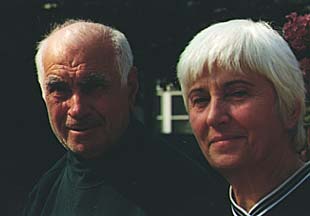 For the life of
a child For the life of
a child
Polish World War II refugees in Iran
By Robert D. Burgener
November 4, 1997
The Iranian
Filipina Stadnicka sat next to the hospital bed and cradled the
hand of her seven year old daughter Zofia. The sun was rising
over the hospital for Displaced Persons located northwest of Tehran
in a sparsely settled area that didn't even have a name. The
doctor
had told her the child was dying.
Most of the patients, former prisoners of war who ended up in
Iran after the Soviets released them in 1941, and the staff of
Polish
doctors and nurses had left. It was a year now since the war
had ended and those who weren't afraid of the communists had gone
back
to Poland, others had left for new lives in Mexico or any country
that would take them.
Filipina, her mother and father and young daughter had stayed
in Tehran living in a single room they rented from a family on
Nahid
Street. Filipina had a job teaching at the French School. She
had been a teacher back home in Poland until the summer of 1939.
Zofia was three that summer when they left for a short vacation
at her parents' home in eastern Poland near the Ukrainian border.
Filipina's husband was the police commissioner for their region
in western Poland and had no free time, so she and "Zosha" went
alone. The morning they were preparing to leave, news came that
the Germans had invaded Poland and within days they heard bombs
falling near her parents' home. Not from German guns.
The Soviet Union had invaded Poland's eastern frontier. Her husband
had managed one phone call to her after the surrender to Germany.
He and other prisoners of war were being taken to a place called
Katyn. She never saw her husband again. In 1941 she and the rest
of the world learned that the Soviet army had massacred 4,000
Polish military officers and civilian officials in Katyn forest.
She looked down at her daughter's unconscious face. So much had
happened to them. The knock on her parent's door after midnight
and the Soviet secret police giving the family one hour to gather
their belongings. Being loaded into the cattle cars of a train
headed east for the steeps of Kazakstan and the labor camps and
finally Comrade Stalin's announcement in 1941 that they were
free to go home - but what home.
The trek across the Caspian to Iran with her mother and daughter
, following in the footsteps of the re-constituted Polish Army
which had been sent to Iran to guard the oil fields, had been
marked with one of the few joyous moments of the war years when
they discovered
that her father and brother were alive and the family was reunited.
Now, this. Two days before, she and Zosha were crossing a street
in Tehran enroute to school when the Iranian Army truck came
round the corner and struck them. Filipina's injuries were not
serious
but Zosha's young body was badly broken and the doctor said that
without a new miracle drug called penicillin, the infection that
was spreading would kill her.
When Filipina arrived at Nahid street
several of her Iranian neighbors had gathered to offer condolences
and help. Shoja Ashrafi, a Captain
in the Iranian cavalry, lived just up the street and he and Filipina
had managed to exchange a few words in French since she could
not speak Farsi and he didn't know Polish. She shared the grave prognosis and the doctor's comment about
the miracle drug. It was Friday, the Moslem sabbath, and she knew
it
would be impossible to find anyone at the Ministry of Health
and that was the only place that could distribute such new and
scarce
medications.
Returning to the hospital, she sat between her daughter's
bed and the open window. A cool evening breeze had begun to ease
the stifling
heat and as she leaned closer to the window she heard the sound
of horses' hooves. She looked out to see Captain Ashrafi and
his sergeant galloping toward the hospital.
The doctor, accompanied by Captain Ashrafi, burst into Zosha's
room and announced that at last they had penicillin.
The young Captain, had rode to the health minister's home where
he shared his concerns - evidently in a most convincing way. The
Minister went to his office and removed one of only four vials
of penicillin in all of Iran and gave it to Captain Ashrafi - "for
the life of a child." 
Captain Ashrafi & Zofia Jozefowicz-Niedzwiecka
Zofia Jozefowicz-Niedzwiecka returned to Poland to attend university.
She went on to be a senior interpreter for the Polish Parliament
involved in many high-level exchanges between Warsaw and Tehran.
She retired from the Persian studies department of the University
of Warsaw.
Captain Ashrafi and Filipina were married in Tehran and had three
children of their own. One son and a daughter are successful
business executives with American companies and another son is
a justice
on the New Jersey Supreme Court. Mrs. Ashrafi died on August
1st of this year while visiting Zofie in Warsaw. Copyright Robert D. Burgener. Permission to reprint given to The Iranian.
For information on a documentary video on this almost-forgotten
chapter of World War II, see "Tales
of the Persian Corridor - Bridge To Victory".
* Send
this page to your friends
|